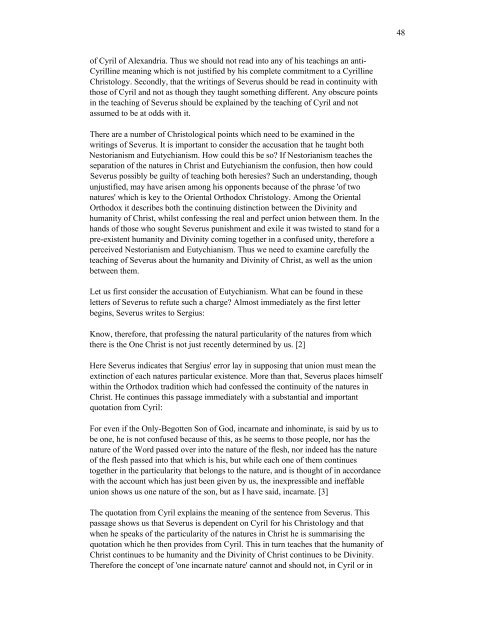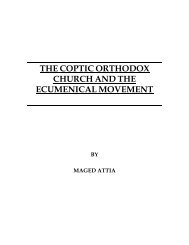Coptic interpretations of the Fourth Ecumenical Council - Saint Mina ...
Coptic interpretations of the Fourth Ecumenical Council - Saint Mina ...
Coptic interpretations of the Fourth Ecumenical Council - Saint Mina ...
Create successful ePaper yourself
Turn your PDF publications into a flip-book with our unique Google optimized e-Paper software.
<strong>of</strong> Cyril <strong>of</strong> Alexandria. Thus we should not read into any <strong>of</strong> his teachings an anti-<br />
Cyrilline meaning which is not justified by his complete commitment to a Cyrilline<br />
Christology. Secondly, that <strong>the</strong> writings <strong>of</strong> Severus should be read in continuity with<br />
those <strong>of</strong> Cyril and not as though <strong>the</strong>y taught something different. Any obscure points<br />
in <strong>the</strong> teaching <strong>of</strong> Severus should be explained by <strong>the</strong> teaching <strong>of</strong> Cyril and not<br />
assumed to be at odds with it.<br />
There are a number <strong>of</strong> Christological points which need to be examined in <strong>the</strong><br />
writings <strong>of</strong> Severus. It is important to consider <strong>the</strong> accusation that he taught both<br />
Nestorianism and Eutychianism. How could this be so? If Nestorianism teaches <strong>the</strong><br />
separation <strong>of</strong> <strong>the</strong> natures in Christ and Eutychianism <strong>the</strong> confusion, <strong>the</strong>n how could<br />
Severus possibly be guilty <strong>of</strong> teaching both heresies? Such an understanding, though<br />
unjustified, may have arisen among his opponents because <strong>of</strong> <strong>the</strong> phrase '<strong>of</strong> two<br />
natures' which is key to <strong>the</strong> Oriental Orthodox Christology. Among <strong>the</strong> Oriental<br />
Orthodox it describes both <strong>the</strong> continuing distinction between <strong>the</strong> Divinity and<br />
humanity <strong>of</strong> Christ, whilst confessing <strong>the</strong> real and perfect union between <strong>the</strong>m. In <strong>the</strong><br />
hands <strong>of</strong> those who sought Severus punishment and exile it was twisted to stand for a<br />
pre-existent humanity and Divinity coming toge<strong>the</strong>r in a confused unity, <strong>the</strong>refore a<br />
perceived Nestorianism and Eutychianism. Thus we need to examine carefully <strong>the</strong><br />
teaching <strong>of</strong> Severus about <strong>the</strong> humanity and Divinity <strong>of</strong> Christ, as well as <strong>the</strong> union<br />
between <strong>the</strong>m.<br />
Let us first consider <strong>the</strong> accusation <strong>of</strong> Eutychianism. What can be found in <strong>the</strong>se<br />
letters <strong>of</strong> Severus to refute such a charge? Almost immediately as <strong>the</strong> first letter<br />
begins, Severus writes to Sergius:<br />
Know, <strong>the</strong>refore, that pr<strong>of</strong>essing <strong>the</strong> natural particularity <strong>of</strong> <strong>the</strong> natures from which<br />
<strong>the</strong>re is <strong>the</strong> One Christ is not just recently determined by us. [2]<br />
Here Severus indicates that Sergius' error lay in supposing that union must mean <strong>the</strong><br />
extinction <strong>of</strong> each natures particular existence. More than that, Severus places himself<br />
within <strong>the</strong> Orthodox tradition which had confessed <strong>the</strong> continuity <strong>of</strong> <strong>the</strong> natures in<br />
Christ. He continues this passage immediately with a substantial and important<br />
quotation from Cyril:<br />
For even if <strong>the</strong> Only-Begotten Son <strong>of</strong> God, incarnate and inhominate, is said by us to<br />
be one, he is not confused because <strong>of</strong> this, as he seems to those people, nor has <strong>the</strong><br />
nature <strong>of</strong> <strong>the</strong> Word passed over into <strong>the</strong> nature <strong>of</strong> <strong>the</strong> flesh, nor indeed has <strong>the</strong> nature<br />
<strong>of</strong> <strong>the</strong> flesh passed into that which is his, but while each one <strong>of</strong> <strong>the</strong>m continues<br />
toge<strong>the</strong>r in <strong>the</strong> particularity that belongs to <strong>the</strong> nature, and is thought <strong>of</strong> in accordance<br />
with <strong>the</strong> account which has just been given by us, <strong>the</strong> inexpressible and ineffable<br />
union shows us one nature <strong>of</strong> <strong>the</strong> son, but as I have said, incarnate. [3]<br />
The quotation from Cyril explains <strong>the</strong> meaning <strong>of</strong> <strong>the</strong> sentence from Severus. This<br />
passage shows us that Severus is dependent on Cyril for his Christology and that<br />
when he speaks <strong>of</strong> <strong>the</strong> particularity <strong>of</strong> <strong>the</strong> natures in Christ he is summarising <strong>the</strong><br />
quotation which he <strong>the</strong>n provides from Cyril. This in turn teaches that <strong>the</strong> humanity <strong>of</strong><br />
Christ continues to be humanity and <strong>the</strong> Divinity <strong>of</strong> Christ continues to be Divinity.<br />
Therefore <strong>the</strong> concept <strong>of</strong> 'one incarnate nature' cannot and should not, in Cyril or in<br />
48








